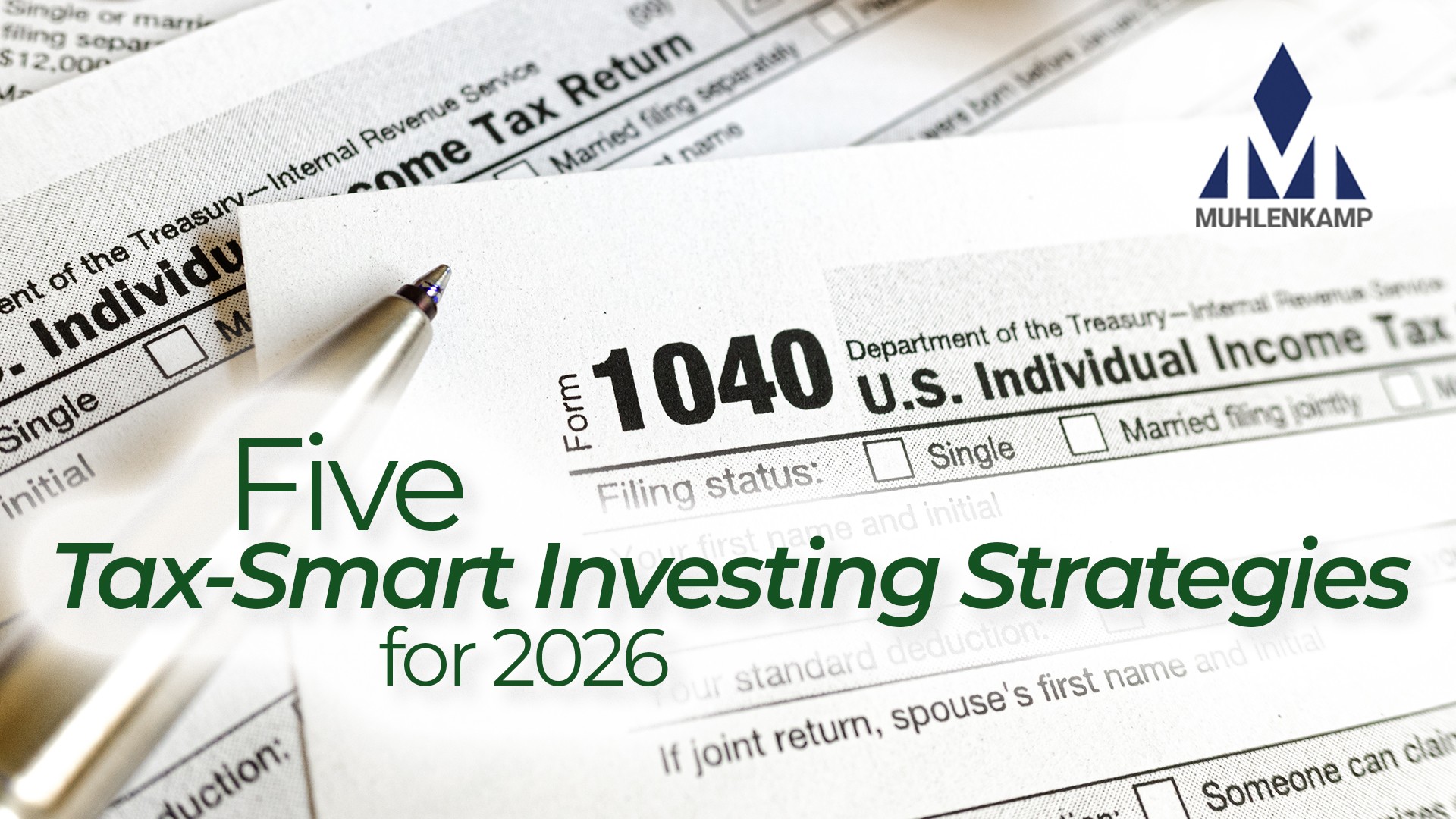Social Security and the 2033 Question
Social Security is likely part of your retirement plan—but how much can you actually count on it? And when should you start taking benefits? The answers depend on understanding what Social Security really is, how it works, and where you are in life. Some observations: In Fleming v Nestor (1960), the Supreme Court ruled that Social Security benefits are not an “accrued property right” or contractual obligation. Paying Social Security taxes does not grant a worker a legally binding entitlement to receive specific benefits in the future. Social Security has always been “pay as you go,” meaning benefits were paid [...]
Five Tax-Smart Investing Strategies for 2026
Tax-smart investing is a dynamic and ongoing process. You can keep more of your hard-earned money by leveraging tax-advantaged accounts, prioritizing tax-efficient investments, and staying proactive about ever-changing tax laws. As 2026 unfolds, make it the year you take your tax strategy to the next level—because it’s not just about what you earn; it’s about what you keep after tax. Here are five strategies that help to maximize what you keep when it’s time to pay Uncle Sam. Maximize Tax-Advantaged Accounts. Tax-advantaged accounts remain a cornerstone of intelligent investing. These include: 401(k)s, IRAs, and Roth IRAs: Contribute the maximum allowable [...]
The 5 Ps of Rational Investing: What Matters Most
It’s hard to be rational when investing, ESPECIALLY when emotions seem to drive the markets. We’ve written about rational versus emotional investing in “The Game of the Stock Market vs. The Business of Investing” and “When Emotions Hijack Your Investment Returns,” but we have distilled those ideas into the Five P’s of Rational Investing. The interesting thing about market cycles isn’t just how they unfold—it’s also how investors respond to them. By nature, investors become complacent when markets are strong and panic when markets take a downturn. Both responses undermine long-term success. The best investors do something different. They maintain [...]
Muhlenkamp Memorandum #157
The economy showed modest growth in Q4, with a split between expanding services and contracting manufacturing. The Fed cut rates three times and quietly resumed asset purchases, raising questions about their inflation strategy. While AI excitement showed signs of cooling, gold delivered exceptional returns—up 70% for the year. We also invested in cyclical companies positioned for recovery. Read our full Quarterly Letter for a complete year-end review. Click to print a PDF copy of the full Memorandum.
Making the Most of Year-End: A Practical Guide
December 2025 Year-end planning letters typically arrive stuffed with charts, acronyms, and dozens of action items that leave you feeling overwhelmed before you finish reading. We're going to take a different approach. Let's talk about the handful of things that actually move the needle. The Big Picture Before we dive into tactics, let's be clear about what matters: You want to keep more of what you earn, protect what you've built, and pass on something meaningful to the people and causes you care about. Everything else is just mechanics. The tax code changes regularly, exemption limits shift with inflation, and [...]
Letter to My Daughters: On Professions and Callings
“He measured all his fellow workers by the test of professionalism, and a professional is a man who can do his best work when he doesn't feel like it.”--Alistair Cooke, About Humphrey Bogart from his book “Six Men." “A job is different from a calling. A job puts food on the table. It pays the bills. A calling is the most important thing you can do in this life in which you would be most difficult to replace.”--Gary North My definition: A calling feeds your soul; a profession feeds your body. You get paid for your profession; you may very well [...]
Navigating Market Noise: The Challenge of Separating Signals from Distractions
In the fast-paced world of investing, one of the most crucial skills is learning to distinguish between meaningful market signals and temporary distractions. Recent discussions among our investment team highlighted this ongoing challenge and the nuanced approach required to navigate today's information-rich environment. The Nature of Market Distractions Market participants face a constant barrage of what we call "distractions" – pop culture events, policy announcements, speculation on Federal Reserve moves, and other news that can dominate headlines and investor attention. While these events may seem significant at the moment, many prove to be temporary diversions from the underlying economic and [...]
When Emotions Hijack Your Investment Returns
There's a paradox at the heart of investing that costs people millions: their investments often perform far better than they do. An investment strategy might beat the market by 3% annually, yet the average investor in that strategy loses money. The culprit? Emotions. Fear is a powerful force. It whispers in our ears during market volatility, urging us to abandon our strategy at precisely the wrong moment. It convinces us that this time is different—that the rules we established in calmer moments no longer apply. It transforms a rational investment process into an emotional roller coaster where we buy high [...]
Muhlenkamp Memorandum #156
In this issue of the Memorandum, Jeff and Ron Muhlenkamp report a moderating economy with no expected recession, though they remain cautious about high market valuations and the AI investment boom. While the Federal Reserve has begun cutting rates in response to labor market weakness, the firm's primary concern remains the unsustainable federal deficit and its likely resolution through inflation and currency debasement—reflected in gold's remarkable 42% year-to-date surge. Read more of their insights in their current Quarterly Letter. Click to print a PDF copy of the full Memorandum.
Letter to My Daughters: On Stocks and Bonds
We’ve looked at planning and goal setting, identifying and defining risk, and what it takes to earn a living and generate sufficient income that you can start saving. But what can you do with your money once you’ve earned it and NOT spent it? You can lend the money to someone (who will use that loan to make money of their own), or you can own a piece of something (hopefully something productive). That’s it. Everything offered as an investment product or investment vehicle is derived from either lending or owning, or some combination of the two. Loans are things [...]










